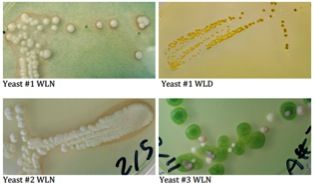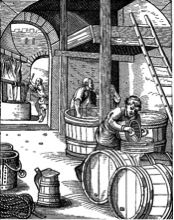Thoughtful Zymurgy: A Holistic Study of the Art and Practice of Brewing Beer
Plan Author
- Elliot Samuel-Lamm, 2013
Fields of Concentration
- Biochemistry
- Film-Video Studies
Sample Courses
- Tutorial: Microbiology
- Tutorial: Identifying and Brewing with Wild Yeast
- Tutorial: Wood Block Printing and Design for Commercial Packaging
Project Description
An investigation into the history and biochemistry of brewing, culminating in an original beer made from local ingredients.
Faculty Sponsors
Outside Evaluator
- Christopher D. Jarvis, Associate Professor of Cell Biology, Hampshire College
Overview
People have been producing and drinking beer for millennia, but modern beers bear little resemblance to brews from the middle ages. Though beer has been an internationally traded commodity since the 14th century, it was primarily produced and consumed locally for most of its history. Early beers contained less alcohol and tasted sweeter than their modern counterparts, and its high sugar content was a crucial component of Medieval and Early Modern diets. This Plan explores the history of beer in Europe, and combines historical methods of local brewing with modern biochemistry techniques to produce a beer sourced almost entirely from wild ingredients found on the Marlboro campus.
Yeast samples from the college’s apple trees were analyzed in the biochemistry lab to identify optimal strains for brewing. Once the proper yeast was identified, it was added to a mixture of spring water, wild blackberries, and hops from the campus garden. The finished product resembled an Early Modern era saison, a nutrient-rich beer that was often offered as pay to seasonal laborers. Additionally, the Plan includes a film which uses Direct Cinema techniques to explore the economy of beer from production to consumption.
Excerpts
“Hops were first added to beer for economic reasons, as they extended shelf life and allowed brews to be shipped over long distances. Despite these economic benefits, the English resisted the adoption of hops, preferring their beer sweet rather than bitter – a preference that lasted until the 19th century.”
“The bitter properties of hops come from the alpha acids they contain. However, alpha acids are not very water soluble, so simply steeping hops will not release their full flavor. Boiling hops isomerizes their alpha acids into iso-alpha acids, which have a different molecular arrangement and are much more water soluble.”
“When done correctly, there is very little that is spontaneous about modern beer making. One brewer I spoke with told me he sometimes felt like a janitor, doing things when necessary to maintain a process that largely occurs without human interaction.”



